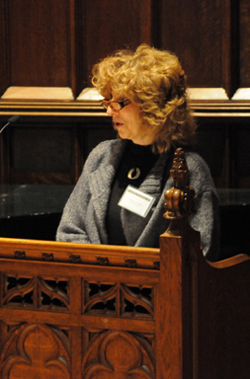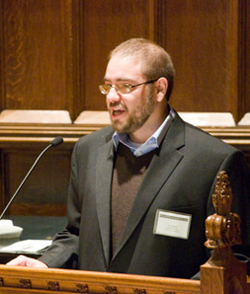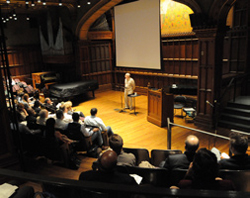A Time to Question
A conference hosted by the Philosophy Outreach Program targets teenagers' tendency to challenge
A conference hosted by the Philosophy Outreach Program targets teenagers’ tendency to challenge
As a high school teacher, Penny Kapinka-Stephenson, a part-time TC student pursuing her degree in the Secondary Education Teaching of English program, was prepared for challenging teen-agers. What has surprised Kapinka-Stephenson, who teaches English, Global History and Psychology, is how often those challenges take the form of genuinely profound questions such as How do we know what we know? Or What is beauty?
“Adolescence is a time of awareness,” says Guillermo Marini, a TC doctoral student in the Philosophy in Education program and a founding member of the Columbia University Philosophy Outreach Program. “Students are distinguishing themselves from their parents and from the larger group, and questioning what they want to do with their lives.”
That was the underlying premise of “Philosophy in Schools,” a conference hosted by the Outreach Program that Kapinka-Stephenson and 180 other teachers, graduate students, faculty and school administrators attended in TC’s Milbank Chapel in October. The Columbia University Outreach Program is a collaboration between graduate students in the Department of Philosophy at Columbia University and the Philosophy and Education Program of Teachers College. For the past two years, 30 student volunteers with the outreach program have been bringing the ideas of Aristotle, Kant and Nietzsche and others to New York City students in the form of guest lectures, workshops, and after-school programs at both public and private schools. Last year, the Columbia University Philosophy Outreach began a unique collaboration co-teaching the Philosophy curriculum at Columbia Secondary School, the only public secondary school in the nation to offer a multi-year philosophy curriculum.
The movement to include philosophical education in American primary and secondary schools is growing, as evidenced by representation at the October conference by attendees from the University of Arizona, Yale University, Mt. Holyoke, University of Washington, University of Memphis, University of Mississippi, the University of Toronto and other top institutions.
“If you teach math or English, you have professional networks, but if you teach philosophy, you don’t—but that’s changing,” said Roberta Israeloff, Director of the Squire Foundation, in her remarks. The Foundation has been funding the Philosophy Outreach program since its inception in 2008.
“There’s great momentum and a real need for this,” says Timothy Ignaffo, TC doctoral student in the Philosophy in Education program, who co-organized the conference (along with Michael Seifried) and is the coordinator of the Outreach program.
Indeed, many people feel that the kind of logic and open-ended inquiry employed in philosophical reasoning is essential not only for many 21st century jobs, but also for grappling with many of the world’s most formidable challenges. Yet current education standards don’t support the development of such skills.
“Standardized tests don’t necessarily lead to success or failure in society,” said Robert Paul Wolff, Professor Emeritus, Philosophy and Afro-American Studies, University of Massachusetts, Amherst, who delivered the event’s keynote address. “If our students fail, it’s our problem.”
Wolff recalled how one student approached him after class with questions about the text he’d assigned. “David Hume had reached across two centuries and grabbed this kid by the scruff of the neck, changing his life forever,” he said, adding that making a difference in one student’s life is enough. “If you could change the whole society,” he said, “you would be a dictator.”
Student representatives from outreach programs across the country also spoke, sharing tips on strategies for engaging in text-based dialogues with younger students. Nemira Gasiunas, a second year doctoral student in Columbia University’s Philosophy program, opened her presentation with a quote from Kahlil Gibran that encapsulated her experiences as a volunteer at the Manhattan Free School: “…a teacher can only lead you to the threshold of your own mind.”
Ignaffo hopes to expand the Outreach Program beyond the discipline of philosophy, in the form of a non-profit, tentatively called the Center for Humanities and Philosophical Education. “If we’re going to expand the discussion for a more nuanced dialogue on education, we have to go beyond philosophy, thinking broadly and deeply on a number of subjects,” he said.
Ignaffo currently is in preliminary talks with a representative from Columbia University’s CORE curriculum, to include other disciplines in the outreach program. In addition to providing assistance to other institutions interested in setting up outreach programs, he and his colleagues have recently established a new certification program, which is being piloted at Columbia Secondary School, where philosophy has been an integral part of the curriculum since the school’s opening in 2007. Through the program—the first of its kind—12 Philosophy in Education students are seeking to apply their volunteer experience to student teaching hours and receive their Transitional C certification.
This news is heartening to Kapinka-Stephenson, who says that currently there aren’t many courses available at the secondary education level to learn about these concepts. “This is important,” she says. “I hear more and more students who’ve gone on to undergrad come back and say that their counterparts are well-versed in these issues. I’d love to gain some concrete ways to introducing these concepts in the classroom.”
As if on cue, after the keynote address ended, Chris Ng, a TC student and outreach volunteer, approached Kapinka-Stephenson and said, “I wanted to introduce myself. I might have some ideas for you.”
Published Monday, Dec. 20, 2010


